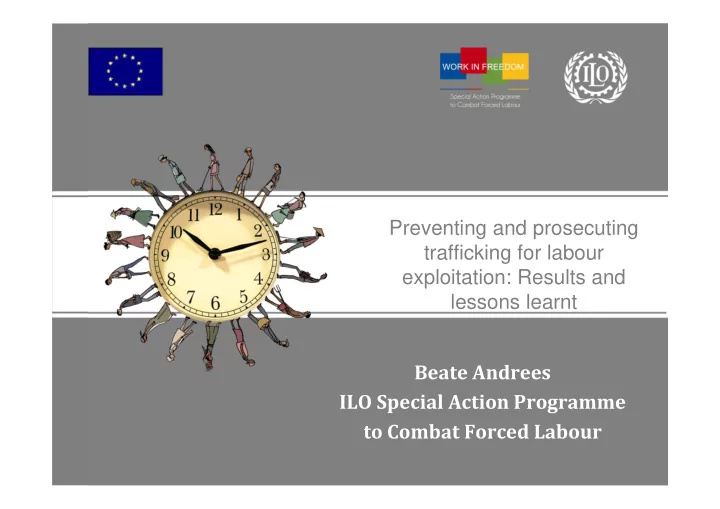

Preventing and prosecuting trafficking for labour exploitation: Results and lessons learnt Beate Andrees ILO Special Action Programme to Combat Forced Labour
Forced labour and trafficking – scope of the problem Total Forced Labour Total Trafficked Industrialized Economies 360,000 270,000 Transition Economies 210,000 200,000 Asia and the Pacific 9,490,000 1,360,000 Latin America and the Caribbean 1,320,000 250,000 Sub-Saharan Africa 660,000 130,000 Middle East and North Africa 260,000 230,000 World 12,300,000 2,450,000 ILO Global Estimate, 2005
ILO’s strategy – link to the EU Action Plan and Action Oriented Paper Action Plan adopted by ILO Governing Body in 2009: – Data collection and research – Law enforcement and labour justice – Capacity building for workers’ and employer’s organisations – Prevention and poverty reduction in developing countries – Protection of migrant workers in source and destination countries
ILO’s Special Action Programme to combat Forced Labour (SAP-FL) • Established by ILO Governing Body decision in 2001 • Global Reports in 2001, 2005 and 2009 • Programme was set up under the 1998 ILO Declaration on Promoting Fundamental Principles and Rights at Work – a main pillar of ILO’s decent work agenda • EU member States (The Netherlands, UK/DFID and Irish Aid) provided core funding between 2001-2011 � EC is core donor of SAP-FL’s field-based anti- trafficking projects
Our donors of field projects
Donor funds – field projects Donor funds ‐ field projects (2002 ‐ 2013 total) in thousand US$ 4780 4705 4447 4305 3622 3520 3097 2791 962 300 200 50 2002 2003 2004 2005 2006 2007 2008 2009 2010 2011 2012 2013
EC funded projects 2006 - 2011 • Enhancing the cooperation to fight trafficking in human trafficking in human being from Nigeria to Europe • Zambia Implementation of policy and the national plan of action against human trafficking • Capacity-building for Migration Management in China (China & selected EU destination countries, Phase 1&2) • Development of a comprehensive anti-trafficking response in Armenia, Azerbaijan & Georgia (Phase 1&2) • Elimination of Human Trafficking from Moldova & Ukraine through labour market based measures
Project example: Southern Caucasus � Joint project with OSCE, ICMPD and IOM, strong interaction with EC delegation in Georgia Objectives: 1. Strengthening national institutions involved in fighting forced labour/trafficking; 2. Preventing THB through labour-market based interventions; 3. Improve identification, investigation and prosecution of THB cases 4. Improve assistance and protection of victims
Selected achievements • NRM established in Azerbaijan, procedures improved in Armenia and Georgia; NAPs revised covering all policy areas and monitoring • Employers’ organisations adopted codes of conducts in all 3 countries; PrEAs set up business associations • Trade unions got involved in awareness raising and protection (e.g. SerbAz case) – more than 300 likely and actual victims received assistance
Main achievements: Europe 1. DELPHI indicators (implemented jointly with EC) are now widely used by national authorities and bureaus of statistics 2. National surveys implemented and data owned by governments (e.g. Moldova, Armenia), in addition to qualitative research 3. Labour inspection network in EU member States strengthened and training modules developed – more than 300 labour inspectors trained � Results were largely achieved through funding by EC
Key lessons learnt • Field based project need duration of at least 4 years to show impact • Focus should be on institution building and policy change in order to ensure sustainability • Building partnerships is essential • Mainstreaming of THB is employment and other policy agenda has greater impact • Empowerment is key – link to decent work agenda
Future agenda – scope for further collaboration • Support data collection efforts at national levels • Faciliate collaboration between EU member States and third countries in the fight against trafficking • Adressing the «demand side» (EU Action Plan) by involving employers and business in action against trafficking • Sector-based initiatives, e.g. forced labour in fishing, domestic workers • Strengthening protection and identification by involving labour inspection and trade unions
For further information www.ilo.org/forcedlabour Or email us at forcedlabour@ilo.org
Recommend
More recommend